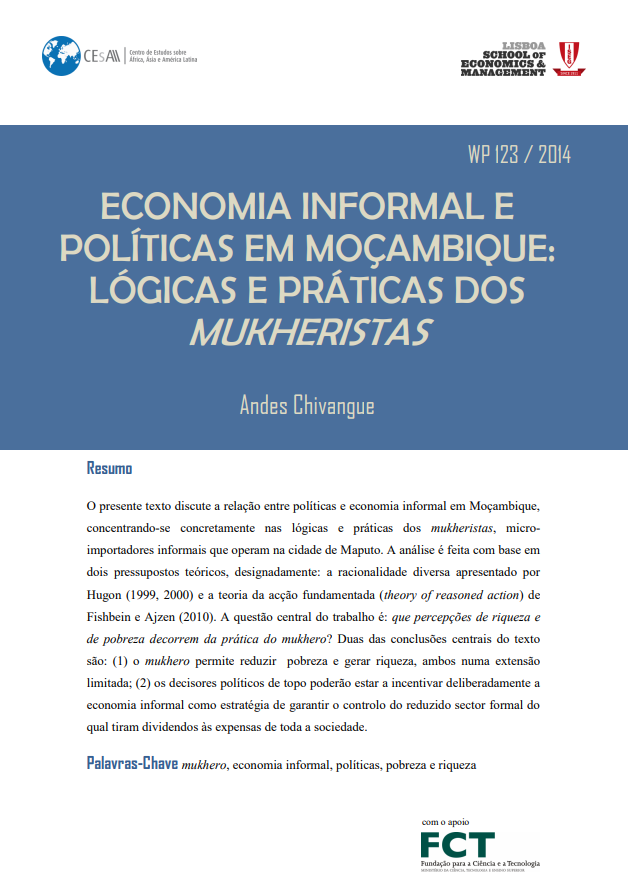Working Paper 123/2014: Economia informal e políticas em Moçambique: lógicas e práticas dos Mukheristas

Title: Working Paper 123/2014: Economia informal e políticas em Moçambique: lógicas e práticas dos Mukheristas
Author(s): Chivangue, Andes
Publication Date: 2014
Publisher: ISEG - CEsA
Quotation: Chivangue, Andes .2014. "Economia informal e políticas em Moçambique : lógicas e práticas dos Mukheristas". Instituto Superior de Economia e Gestão. CEsA - Documentos de Trabalho nº 123/2014.
Abstract: This text discusses the relationship between policies and the informal economy in Mozambique, specifically focusing on the logics and practices of the mukheristas, informal micro-importers operating in the city of Maputo. The analysis is based on two theoretical assumptions, namely: the diverse rationality presented by Hugon (1999, 2000) and the theory of reasoned action by Fishbein and Ajzen (2010). The central question of the work is: what perceptions of wealth and poverty derive from the practice of mukhero? Two of the main conclusions of the text are: (1) the mukhero makes it possible to reduce poverty and generate wealth, both to a limited extent; (2) top policy makers may be deliberately encouraging the informal economy as a strategy to ensure control of the small formal sector from which they derive dividends at the expense of society as a whole.
Identifier: http://hdl.handle.net/10400.5/7042
Category: Working paper
Abstract:
The informal sector in Mozambique is a source of employment and survival resources for most of the population. Mostly dominated by women, it is through this sector that some social mobility of urban populations can be observed, guaranteeing education, health and even leisure for their families. Economia informal e políticas em Moçambique : lógicas e práticas dos Mukheristas discusses the relationship between policies and the informal economy in Mozambique, specifically focusing on the logics and practices of the mukheristas, informal micro-importers operating in the city of Maputo. The analysis is based on two theoretical assumptions, namely: the diverse rationality presented by Hugon (1999, 2000) and the theory of reasoned action by Fishbein and Ajzen (2010). The central question of the work is: what perceptions of wealth and poverty derive from the practice of mukhero? Two of the main conclusions of the text are: (1) the mukhero makes it possible to reduce poverty and generate wealth, both to a limited extent; (2) top policy makers may be deliberately encouraging the informal economy as a strategy to ensure control of the small formal sector from which they derive dividends at the expense of society as a whole.
Quotation:
Chivangue, Andes .2014. “Economia informal e políticas em Moçambique : lógicas e práticas dos Mukheristas”. Instituto Superior de Economia e Gestão. CEsA – Documentos de Trabalho nº 123/2014.





